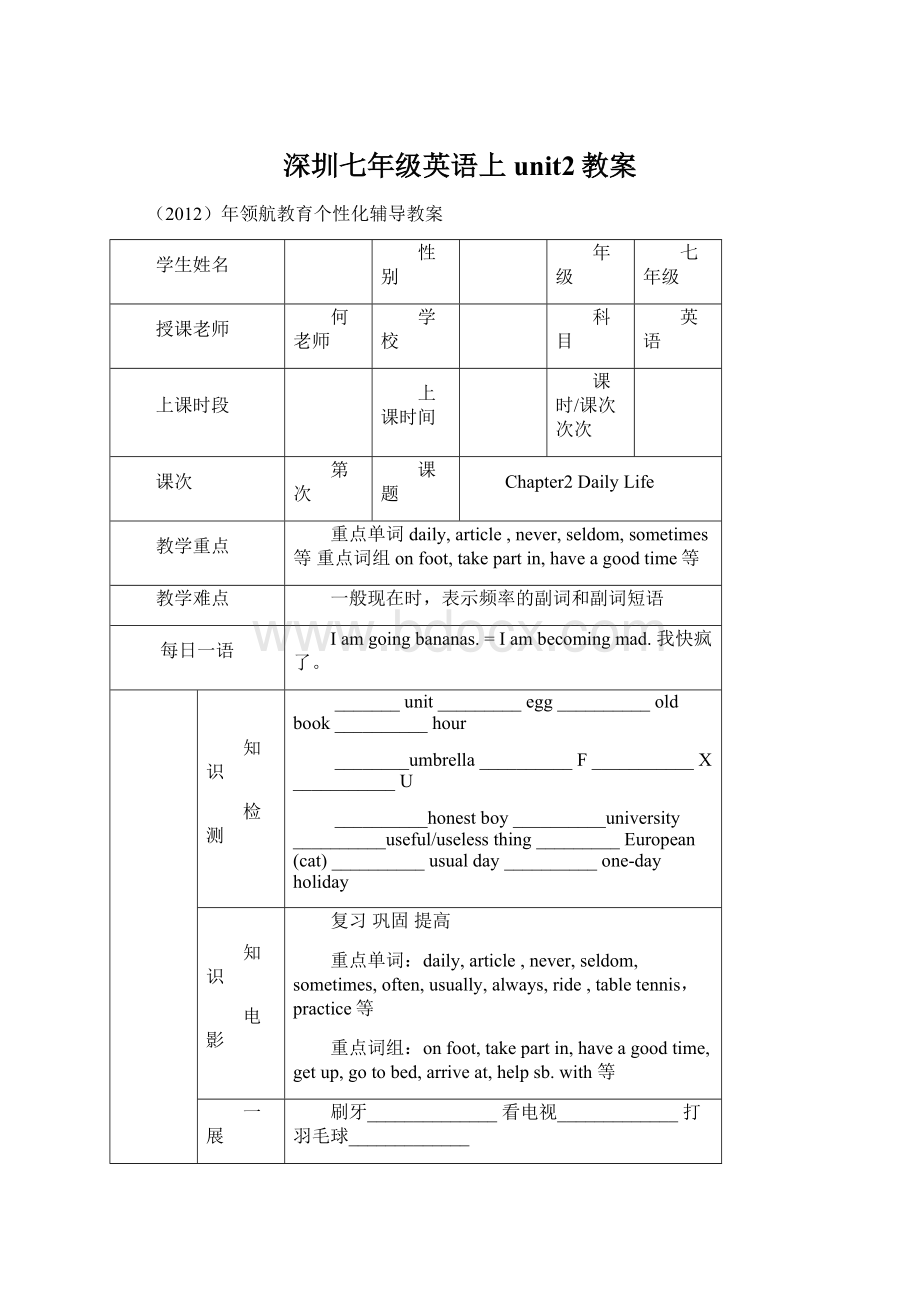深圳七年级英语上unit2教案.docx
《深圳七年级英语上unit2教案.docx》由会员分享,可在线阅读,更多相关《深圳七年级英语上unit2教案.docx(13页珍藏版)》请在冰豆网上搜索。

深圳七年级英语上unit2教案
(2012)年领航教育个性化辅导教案
学生姓名
性别
年级
七年级
授课老师
何老师
学校
科目
英语
上课时段
上课时间
课时/课次次次
课次
第次
课题
Chapter2DailyLife
教学重点
重点单词daily,article,never,seldom,sometimes等重点词组onfoot,takepartin,haveagoodtime等
教学难点
一般现在时,表示频率的副词和副词短语
每日一语
Iamgoingbananas.=Iambecomingmad.我快疯了。
知识
检测
_______unit_________egg__________oldbook__________hour
________umbrella__________F___________X___________U
__________honestboy__________university__________useful/uselessthing_________European(cat)__________usualday__________one-dayholiday
知识
电影
复习巩固提高
重点单词:
daily,article,never,seldom,sometimes,often,usually,always,ride,tabletennis,practice等
重点词组:
onfoot,takepartin,haveagoodtime,getup,gotobed,arriveat,helpsb.with等
一展
身手
刷牙______________看电视_____________打羽毛球_____________
骑自行车_____________弹钢琴_____________弹吉他_____________
洗衣服_____________高中_____________初中_____________
早休_____________参加_____________在图书馆_________________
备课_________帮助某人做某事_____________________写日记_________________
twiceaweek_____________onSaturdays_____________onceamonth_____________
domorningexercise__________gotobed_____________haveclasses_____________
gohome_____________havelunch_____________havebreakfast_____________
washface_____________have/cookdinner_____________gotobed_____________
getup_______________lateintheafternoon_____________haveagoodtime_____________
重
点
知
识
1.Iamajuniorhighschoolstudent.Ilovegoingtoschool.
juniorhighschool初中seniorhighschool高中primaryschool小学lovedoingsth.=livedoingsth.=enjoydoingsth.喜欢做某事practicedoingsth.练习做某事finishdoingsth.做完某事
gotoschool去上学
2.Breakendsat10:
10.HowShortitis!
endat:
……时间结束
how+adj.(+主+谓)=what+(a/an)+adj.+n.(+主+谓)how主要修饰形容词和副词,what修饰名词。
Howshortitis!
=Whatshorttimeitis!
3.ThenTom,JackandItakepartintheschoolbandpractice.
takepartin:
参加,指参加会议或群众性活动等,着重说明句子主语参加该项活动并在活动中发挥作用;
join指加入某个党派,团体组织等,成为其成员之一,意为:
“参军、入团、入党”等;和某人一道做某事,其结构为:
joinsb.in(doing)sth.,根据上下文,in(doing)sth.也可以省去(joinin多指参加小规模的活动如“球赛、游戏”等,常用于日常口语);
attend是正式用语,指参加会议、婚礼、典礼;听报告、讲座等。
He'llattendanimportantmeetingtomorrow.他明天要参加一个重要会议
band:
乐队theschoolbandpractice:
学校乐队练习
practice:
名词:
练习Learningalanguageneedsalotofpractice.
动词practicedoingsth.practicesth
4.Wemakegreatmusictogether.我们一起演奏动听的音乐。
make是初中英语中出现频率很高的一个动词,它的用法主要有;
make/have/letsb.dosth.使某人做某事
makesb.+adj.做某人……
makefriends交朋友makecakes做蛋糕makeanoise发出噪音makeyourselfathome像在家里一样自然makesure确保
goto…together一起去togetherwith与……一样(常用作插入语)
语
法
专
项
1.一般现在时
一般现在时表示目前的状态及经常发生或习惯性的动作,常与usually,often,sometimes,everyday等状语连用。
也可用于表达一种客观事实、习惯和作息时间表。
一般现在时常常与下面这些时间状语连用:
always(总是)usually(通常)
often(经常)sometime(有时)
seldom(很少)never(从不)
once/twiceaweek(一周一/二次)
everyday/morning(每天/每天早上)
onFridays/Mondays(每逢周五/周一)
一.一般现在时的构成:
1.肯定句:
由主语+谓语动词+其他
Iplaybasketballeverymorning.
Heplaysbasketballeverymorning.
2.否定句:
主语+don’t/doesn’t+动词原形+其他
Idon’tplaybasketballeverymorning.
Hedoesn’tplaybasketballeverymorning.
3.一般现在时的一般疑问句:
助动词do/does+主语+动词原形+其他
Iplaybasketballeverymorning.
--Doyouplaybasketballeverymorning?
--Yes,Ido./No,Idon’t
Heplaysbasketballeverymorning.
--Doesheplaybasketballeverymorning?
--Yes,hedoes./No,hedoesn’t’t.
4.特殊疑问句:
特殊疑问词+do/does+主语+动词原形+其他.
Whatdoyoudoeveryday?
Whatdoesshewrite?
WhendoesTomreadEnglisheveryday?
2)动词第三人称单数变化规则如下:
(1)一般动词后+s;looks,makes,writes
(2)以s/x/ch/sh结尾的动词+es.mixes/discusses/washes/teaches
(3)以o结尾的动词,加es,如goes/does
(4)一些以辅音字母+y结尾的动词,把Y改成i+es.studies/hurries/worries
(5)如y前是元音字母就加s.plays/stays
二.一般现在时的用法:
1.表示经常性或习惯性的动作,常与表示频率的时间状语连用。
Whendoyougotobedeveryday?
2.表示永恒的真理或客观的存在
Theearthmovesaroundthesun.Silkfeelssoftandlight.
3.表示现在时刻的状态、能力、性格、个性
DavidwritesgoodEnglish.OurEnglishteacherisverykindandhelpful.
4.格言或警句中
Pridegoesbeforeafall骄兵必败
5.在时间状语从句和条件状语从句中,常用一般现在时代替将来时。
Iwillgoouttoplayifitdoesnotrain.
IwillcallyouassoonasIcomeback.
2.频度副词(always,usually,sometimes,seldom,often...)在句子中的位置
1)位于主要行为动词的前面。
例:
Heoftendoeshishomeworkintheevening.(does是行为动词)
2)位于be动词的后面。
例:
Sheisalwayslateforschool.(is是be动词)
3)位于助动词和主要行为动词之间。
例:
Idon'tusuallygotoschoolbybus.(don't是助动,go是行为动词)
3.howoften来询问动作所发生的频率。
4.时间状语(once一次twice两次threetimes三次fourtimes四次onMonday/everyday,etc.)常位于句首或句末。
频度副词的用法:
1.often,always,usually等通常和一般现在时连用,表示现在经常或反复发生的动作。
如:
ItoftenrainshereinApril.
2.always与进行时连用时,并不强调动作正在进行,而是表示赞叹、厌烦等情绪。
如:
Heisalwaysthinkingofothers.他总是想着别人。
(赞叹)
Sheisalwaysaskingsillyquestions.她老是问些愚蠢的问题。
(厌烦)
3.对这些频度副词提问时,用howoften。
如:
Tomusuallydoeshislessonsaftersupper.
HowoftendoesTomdohislessonsaftersupper?
区分:
sometime,sometime,sometimes,sometimes
sometime指将来或过去的“某个时候”,指时间点;sometime“一些时间,相当长的时间”,指时间段;sometimes“有时”,是频度副词;sometime“几次,几倍”,time作可数名词,意为“次数,倍数”
everyday表示“每天,天天”,是副词短语;而everyday表示“日常的”,是形容词,强调平常与普通。
Englishiswidelyusedineverydaylife.英语在日常生活中广泛使用。
四、时态:
频度副词常与一般时态连用,如果带某种情感时则与进行时态连用。
如:
1.MyfatherusuallytellsmeastoryonSundayevenings.
2.Whenhewasachild,hewasalwaysaskingquestionsandtryingoutnewideas.
随
堂
练
习
一.给出下列动词的第三人称单数的变化形式
work____________guess_____________
run_____________fix___________
teach___________carry_____________
wash____________go____________
watch___________study_____________
live____________fly____________
finish___________do_____________
hurry____________play__________
二.请用所给词的适当形式填空
1)I__________(take)theschoolbustoworkeveryday.
2)Susan_________(go)toschoolbybuseverymorning.
3)They_________(play)footballintheplaygroundeveryafternoon.
4)He__________(wash)disheseveryevening.
5)We_________(go)shoppingeverySunday.
6)Mylittlebrother__________(watch)TVallday.
三.用所给动词一般现在时态填空
1.Jimusually________(have)lunchathome.
2.LiGuanhua_______(be)twentyyearsold.
3.Howmanystudents________(be)there
inyourclass?
4.---______she_______(study)hard?
---Yes,she_________.
5.Lucyandlily_____________(notspeak)Chinese.
6.Myfather______________(notdo)morningexerciseseveryday.
7.Shealways___________(wash)herclothesonSundays.
8.______yourbrother________(like)playingfootball?
No,he____________.
9.______you________(read)Englisheveryday?
10.Howmanylessons_______yourclassmates________(have)onMonday?
四.句型转换
1.Mydrivercollectsmefromschooltwiceaweek.(对画线部分提问)
_________________yourdrivercollectyoufromschool?
2.Allofherfamilyworkinherbusiness.(改为否定句)
__________herfamilyworkinherbusiness.
3.Afterschool,Iusuallyattendaclub(对画线部分提问句)
__________youusually______afterschool?
4.Lileihasbreakfastatschool.(改为否定句)。
Lilei__________breakfastatschool?
5Shethinkstheboywantstojointheclub.(改为否定句)
She_________theboywantstojointheclub.
6.Iwanttojointheswimmingclub.(对画线部分提问)
_____clubdoyouwanttojoin?
课
后
练
习
一.单选
()1._____doyouusuallyspendonyourhomework?
--Abouttwohours.
A.HowsoonB.HowlongC.HowmanyD.Howmuch
()2.Maryneverplays_____violinathome.
A.theB.aC./D.his
()3.When_____yourmothergetupeverymorning?
A.doB.didC.doesD.doing
()4.OurEnglishteacherusuallygoestoschool_____herowncar
A.withB.byC.forD.in
()5.Jimisalazyboy.He_____studyhard
A.don’tB.doesn’tC.aren’tD.isn’t
()6.Wendy_____comestoschoollate.Sheisalwaysontime.
A.alwaysB.oftenC.sometimesD.never
()7.Sandyhasaviolinlesson_____.
A.yesterdayB.lastweekC.onceaweekD.once
()8.IusuallytalkwithmyclassmatesinEnglish_____home
A.onthewayB.inthewayC.bythewayD.inthisway
()9.Sheisaprettygirlandsheusually_____abeautifulskirt.
A.putonB.putsonC.wearD.wears[来源:
学科网]
()10.Wendyusually_____businessmeetingsonFridays.
A.takespartinB.joinsC.attendsD.goes
()11.Let’s_____ourschoolrulestogether.
A.talkB.discussC.speakD.tell
()13.--_____youandyoursister_____tothesameschool?
--No,wedon’t.Herschoolisfarawayfrommine.
A.Does;goB.Do.goesC.Dose;goesD.Do,go
()14.Sheisoneof_____inherschool.
A.topstudentsB.thetopstudentC.thetopstudentsD.topstudent
()15.Don’tsitonthechair.There_____onit
A.issomewaterB.aresomewaterC.ismywaterD.areanywater
二、用括号内动词的适当形式填空
1.Heoften________(have)dinnerathome.
2.DanielandTommy_______(be)inClassOne.
3.We_______(notwatch)TVonMonday.
4.Nick_______(notgo)tothezooonSundays.
5.______they________(like)theWorldCup?
6.What_______theyoften_______(do)onSaturdays?
7._______yourparents_______(read)newspaperseveryday?
8.Thegirl_______(teach)usEnglishonSundays.
9.SheandI________(take)awalktogethereveryevening.
10.There________(be)somewaterinthebottle.
11.Mike_______(like)cooking.
12.They_______(have)thesamehobby.
13.Myaunt_______(look)afterherbabycarefully.
14.Youalways_______(do)yourhomeworkwell.
15.I_______(be)ill.I’mstayinginbed.
16.She_______(go)toschoolfromMondaytoFriday.
17.LiuTao_______(do)notlikePE.
18.Thechildoften_______(watch)TVintheevening.
19.SuHaiandSuYang_______(have)eightlessonsthisterm.
20. -Whatday_______(be)ittoday?
-It’sSaturday.
21Weoften___________(play)intheplayground.
22.He_________(get)upatsixo'clock.
23.________you__________(brush)you